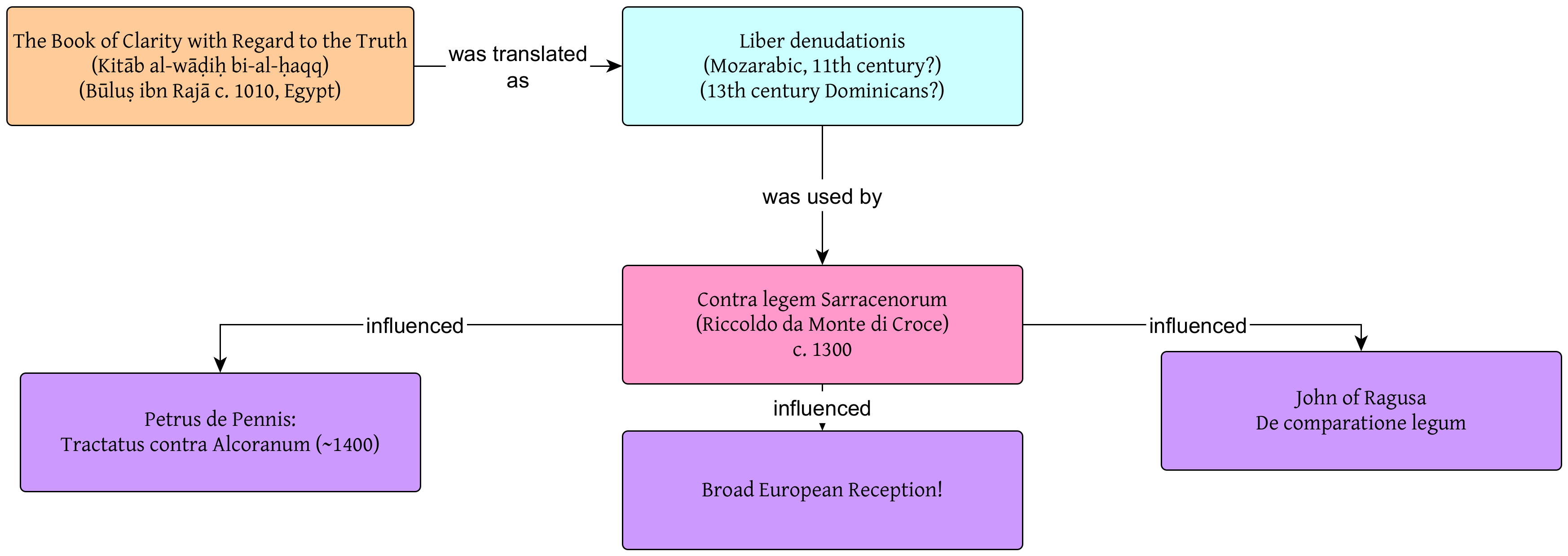Background and Theory
For centuries, Christian scholars have engaged intellectually with Islam. Yet, Edward W. Said has claimed that this discourse was not about understanding Islam, but had the “self-containing, self-reinforcing character of a closed system”(E. W. Said, Orientalism, London etc., repr. 2003 (first edition: 1978), 70.). He termed this phenomenon "Orientalism". Others have countered Said's view, arguing that change, innovation, or even understanding manifested along the way.
The goal of this project was to deepen our understanding of the historical discourse of Christian-Muslim Religious Encounters (CMRE). To achieve this, the project formalized key aspects of this discourse as Linked Data, laying the ground for a comparisons across eras, regions, and languages. Specifically, it concentrated on two critical elements: reference and reuse, and argumentation. But why focus on these?
Reference and Re-Use
Sacred texts like the Torah, Bible, and Qur'an hold a central place in their respective religions. In religious debates, these texts and their commentaries were therefore cited as "authorities" that lend truth to arguments. This approach was also applied in interreligious arguments. In debates between Christianity and Islam, for instance, the Bible and the Qur'an took center stage.
Christians in the Middle Ages, however, usually had no translation of the Qur'an at their disposal. As a result, they consulted secondary sources, such as the work _Contra legem Sarracenorum_ (CLS) by the Dominican friar Riccoldo da Monte di Croce. Riccoldo himself relied on various sources, including the Qur'an, authorized sayings of the prophet (Hadith), and Islamic exegesis (Tafsir). He also leaned on a Latin work called _Liber denudationis_ which is based on an Arabic text, the "Book of Clarity with Regard to the Truth" written by Būluṣ ibn Rajā in 11th-century Egypt. Through this chain of transmission, Būluṣ ibn Rajā's knowledge spread into Europe and beyond.

Understanding these connections is vital for tracing how ideas and arguments spread in interreligious discourse.
Arguments
While references and re-use constitute the basis of the transmission and development of ideas, it raises the question what arguments are made based on them. Alain de Lille famous said: "Since authority has a nose of wax, the sense [of a scriptural passage] can be bent in different ways” (Sed quia auctoritas cereum habet nasum, id est in diversum potest flecti sensum.) (Alain de Lille, De fide catholica I, 30, Migné Patrologia Latina 2I0, 333 A)). This means that authoritative sources can be interpreted in different ways, supporting wildly different viewpoints. To capture this dimension, OTRA also describes which statements were supported by a certain authority. Statements could be, e.g., that "The Qur'an states that the Gospel should be recognized as an authority by Muslims", which is supported by Qur'an 5:46, as quoted by Riccoldo da Monte di Croce, CLS 16,21.
Finally, the arguments are expressed in conjunction with certain topics that are relevant for the interreligious discourse. In the above example, the topic is the Gospel and its truth, and the wider context is that of salvation.
Outputs of the OTRA project
Articles
- ‘Simplify and Doctrinalise, Historify and Personalise: How Two Less-Known Works of Anti-Islamic Polemic from c. 1370–1440 Adapted their Sources’ in: Journal of Qur'anic Studies 25.2 (2023) (European Visions of the Qur'an in the Middle Ages, ed. by F. Ninitte and I. Reginato), 186–210.(https://doi.org/10.3366/jqs.2023.0548)
- Langeloh, Jacob, 'Sharing Knowledge about Interreligious Connections. A Linked Data Approach to Medieval Studies'; forthcoming in TEOL-information, 2024.
Datasets
Editions
- Sections on Muhammad from: Anonymous, Epitome bellorum sacrorum, in: Henricus Canisius (Ed.): Antiquae Lectiones, vol. 6., Ingolstadt, 1604, pp. 249–294.
Talks (some with videos)
- Copenhagen 2024: "Exploring the Network of Christian-Islamic Polemics. Insights and Learnings from the OTRA project"
- Graz, 2023 "Three rings, one story? Reconstructing the historical connectivity of religious encounters within the OTRA project (Ontology for the Transmission and Re-Use of Argumentative Patterns)"
- Nantes, 2023 "Honey-coated poison: how the Qur’an was viewed as a temptation in anti-Islamic polemics, and how to trace a rhetorical motif over time." (Video)
- DHNB 2023 "Collecting and Sharing References in Christian-Muslim Religious Encounters with the OTRA Framework: An Assessment and a Roadmap" (Video)
- Research Seminar, Copenhagen 2022: Warning: Explicit Linkage. Describing and analysing connectivity in (inter)religious argumentation through Linked Open Data
Events
- Workshop Interreligious Connectivity – Digitally Explored (https://otra.hypotheses.org/interreligious-connectivity)